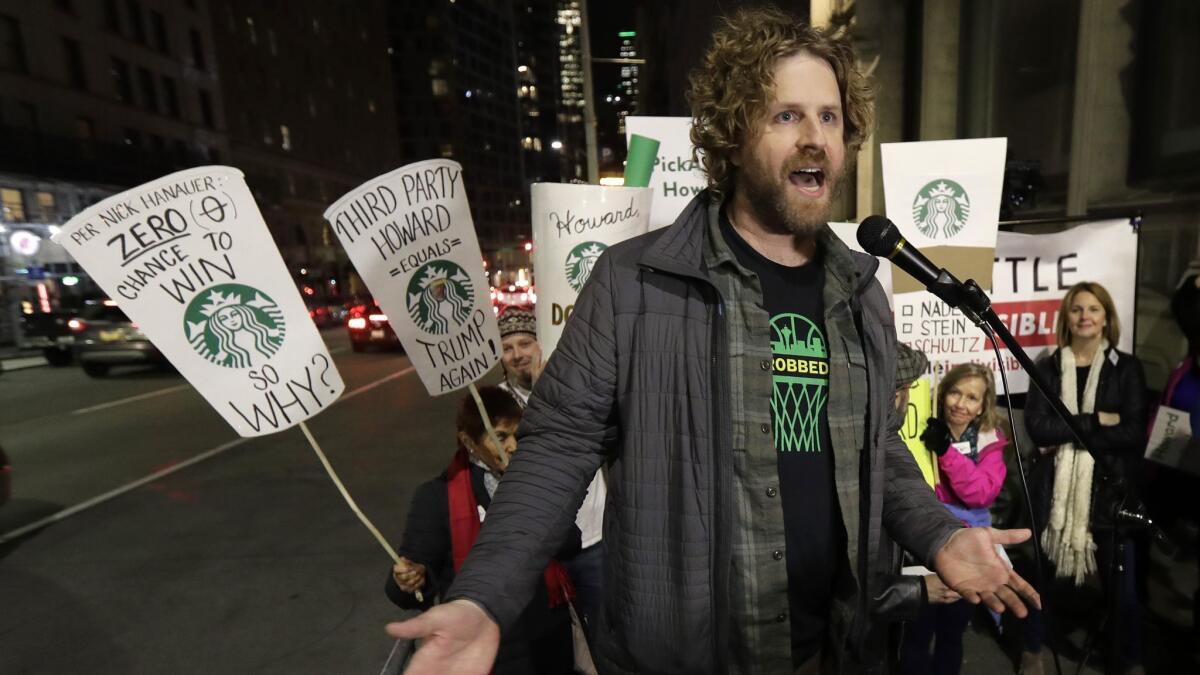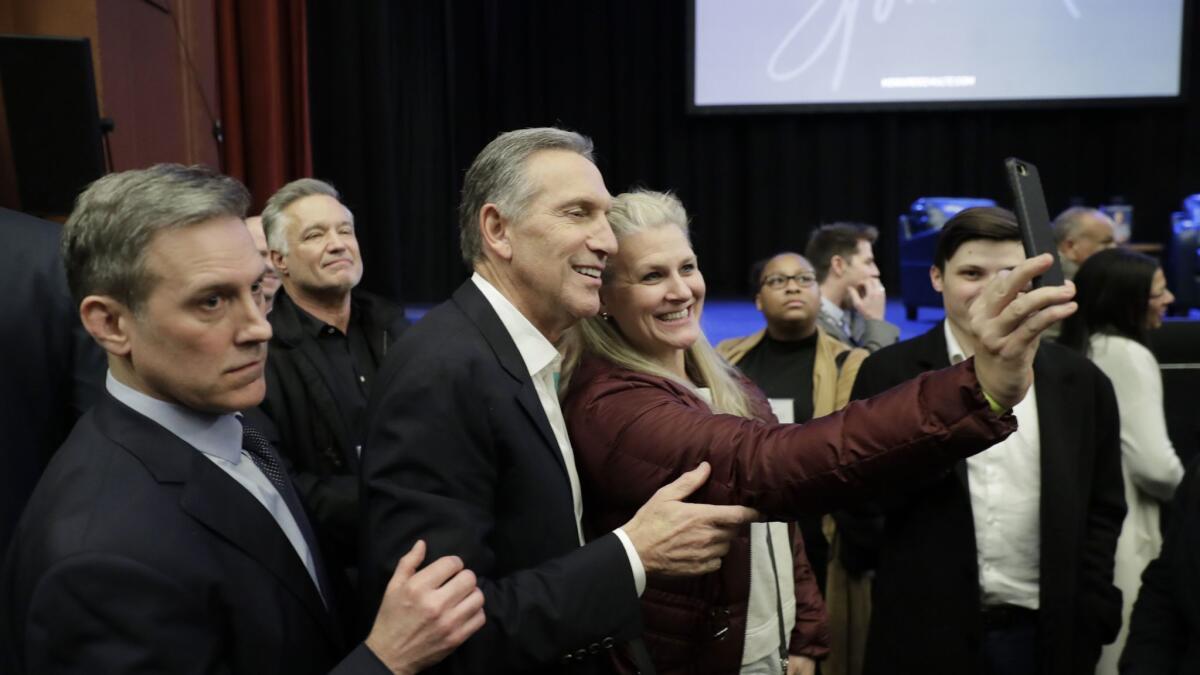Howard Schultz and his possible presidential bid get unwelcome Seattle homecoming

Reporting from Seattle — When Democrats Kamala Harris and Julian Castro announced their 2020 presidential bids, they did so before large, adoring crowds of political allies in their hometowns of Oakland and San Antonio, respectively.
When former Starbucks CEO and Seattle SuperSonics owner Howard Schultz made his first trip home Thursday since declaring his intent to explore an independent bid for the White House, he was greeted outside Seattle’s Moore Theatre — blocks from the first Starbucks location — by dozens of chanting Democrats and bitter basketball fans.
For them, a Schultz candidacy stands to go down about as smoothly as a month-old muffin that’s been licked by a slobbering bulldog.
“Self-absorbed billionaires shouldn’t be running for president,” said rally attendee Mary Hanke, alluding to both Schultz, a lifelong Democrat, and President Trump.
Hanke attended several Sonics’ games when Schultz co-owned the team from 2001 to 2006. When he couldn’t get local government to agree to a sweeter arena deal, Schultz sold the Sonics to an out-of-town group, which promptly moved the team to Oklahoma City.
“It just shows you what kind of temperament he has when he doesn’t get his way,” said Hanke, an opponent of independent bids.
Schultz, at the theater to discuss his new book, “From the Ground Up,” is bucking history with his potential bid. No independent or third-party candidate has ever won the White House, and few have had much meaningful impact.
Still, Democrats are convinced that he would sap enough votes from the party’s eventual nominee to ensure Trump’s reelection, a notion Schultz dismissed.
As he made the media rounds this week, Schultz has directed broadsides at several of the party’s stars, including presidential hopefuls Sens. Harris and Elizabeth Warren.
“He’s done nothing but attack Democrats,” said Tina Podlodowski, chair of the Washington State Democratic Party, who spoke at the rally. “Independent bids can siphon votes away from Democrats. The No. 1 objective of Democrats in 2020 is to get Donald Trump out of the White House. An independent bid by somebody who professes to be a lifelong Democrat is everything from disappointing to ridiculous.”
Podlodowski said it would have been terrific had Schultz chosen to run as a Democrat, pointing out that “he’d be one of multiple candidates with a variety of viewpoints” in a crowded primary. She laments that the Brooklyn-born billionaire will be spending money on “50 sets of lawyers to get him on 50 different state ballots” instead of “grass-roots infrastructure to elect Democrats.”
Onstage at the Moore, Schultz’s reception was relatively warm. Fielding questions from local journalist Monica Guzman while seated comfortably in a green leather chair, Schultz made the case that there was a “silent majority” of Americans ready to support an independent candidacy.
He expressed confusion as to why wealthy, self-made people like himself are subjected to such “punitive conversation” these days, and he described the prospect of four more years of Trump as “disaster-level.”
So, Guzman asked, why not run as a Democrat? “I don’t think there’s any room for me to get the nomination as a centrist person,” replied Schultz, 65.
“If a Democrat should win, I have no confidence whatsoever that we’re going to see any change in the toxicity that exists in Washington,” he said, arguing that Democratic ideas such as public healthcare, free college tuition and “a government job for everyone” — which drew a collective “What?!” from several confused audience members — would be too much of a financial burden, regardless of merit. (Another “what?!” moment came when Schultz identified Arizona, which has been growing increasingly purple, as a solidly Republican state.)
When Guzman’s questioning turned to the Sonics, Schultz was contrite, saying, “Every time I see a kid in a Seattle SuperSonics jersey, I realize I broke that kid’s heart,” echoing the sentiment of an op-ed he wrote that ran in the Seattle Times this week.
It was the first time Schultz had publicly addressed his sale of the Sonics, writing that it was “the biggest regret of my professional life.”
“I wish I held on to the team until someone local wanted to buy it,” Schultz said. “I do not expect my actions to be forgiven or forgotten. I created a wound I cannot heal, and for which I will always be deeply sorry.”
Jason Reid, director of the documentary film “Sonicsgate,” said that while “it’s finally nice to hear those words come out of his mouth,” he thinks Schultz’s apology “feels very opportunistic.”
“It’s hard to take seriously because of the timing,” said Reid, who also spoke at the rally.
Reid, however, sees a sliver of a silver lining now that Schultz won’t be running as a Democrat: He won’t have to worry about the possibility of holding his nose and voting for him in a one-on-one matchup with Trump.
Mike Seely is a special correspondent.

More to Read
Get the L.A. Times Politics newsletter
Deeply reported insights into legislation, politics and policy from Sacramento, Washington and beyond. In your inbox three times per week.
You may occasionally receive promotional content from the Los Angeles Times.










